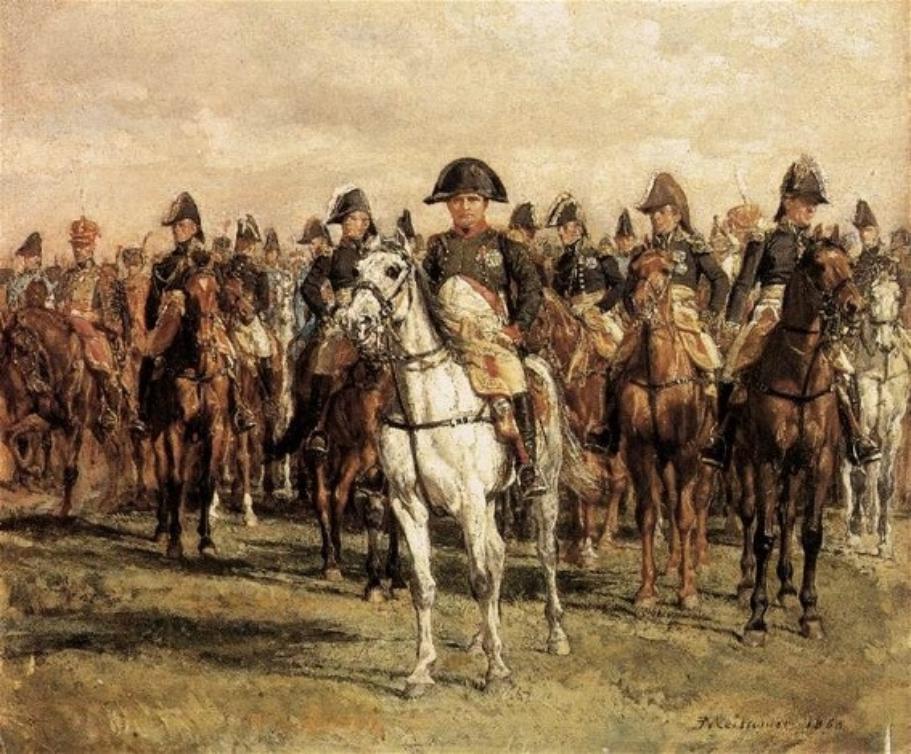
Disaster
(Daniel 11) Verse 42. "He shall stretch forth his hand also upon the countries; and the land of Egypt shall not escape." All Lower Egypt was subdued by him; and all countries felt his powerful influence.
Verse 43. "But he shall have power over the treasures of gold and of silver, and over all the precious things of Egypt: and the Libyans and the Ethiopians shall be at his steps.
Napoleon's army in the famous battle of the Pyramids, greatly enriched themselves with the treasures of silver and gold which they found about the bodies of the Mamelukes whom they killed; Bonaparte also levied contributions on the inhabitants of the country, to support and pay his troops, and brought away much with him.
The Libyans and Ethiopians shall be at his steps. When he first went into Egypt, he landed in what was anciently Called Libya. And his last battle was fought in Upper Egypt, what was anciently called Ethiopia. So that both were at his steps, or he passed through them.
Verse 44. "But tidings out of the east and out of the north, shall trouble him: therefore shall he go forth with great fury to destroy and utterly to make away many."
This verse gives the history of his wars with the allied powers of Europe on the north and east of France. His campaign into Russia was one of the most disastrous ever undertaken. He went forth with an army of nearly 500,000 men, and returned with scarcely 50,000. The fatal battle of Waterloo was dreadful beyond description; and the waste of human life immense. He utterly made away many.
But Bonaparte was only to have a tabernacle where he might sojourn for a few years, and then resign his kingdoms and palaces forever. He was crowned emperor of France, December 2, 1804. On the 11th of April, 1805, he left France to go to Italy, where he was crowned king of Italy on the 26th of May following. All the territory: within the limits before named, in the course of a few years was subjected to his powerful arms.
Yet he shall come to his end and none shall help him. What a striking fulfilment of this stroke of the pen of inspiration, does the history of Napoleon's fall, banishment, and death present! He was crowned emperor of France, 1804; and after desolating Europe with wars for ten years, he met with a fatal defeat from the allied sovereigns of Europe at the battle of Waterloo. At the request of the chamber of Deputies, he voluntarily abdicated the throne of France in favor of his son, on the 22nd of June, 1815. In his declaration of abdication, he thus expressed himself. "My political life is ended; and I proclaim my son, Napoleon the Second, emperor of the French." But this proclamation was a mere sound; for on the 8th of July following, "Louis," the hereditary monarch of the French, made his public entry into Paris, and took formal possession of the throne of his ancestors. Thus came to an end the government of Napoleon, the man at whose nod the world had trembled.
After his abdication he left Paris, and reached Rochefort on the 3rd of July; and made preparation for sailing for America. But the port being blockaded by eleven English ships of war, and finding himself unable to escape, he resolved to trust to the magnanimity of the English government; and entered into negotiations for embarking on board one of the British ships, and going to England. After arrangements had been made for his reception, he bid farewell to France, went, on board of the Bellerophon, commanded by Capt. Maitland, and sailed for England. When he arrived there, he was not permitted to land, but was doomed by the British government, against all his remonstrances and entreaties, to banishment on the Island of St. Helena, in the Atlantic Ocean. There he arrived on the15th of October, 1815, with a few of his most intimate friends. On this desolate and barren rock, the conqueror of Europe was doomed to fill up his days. The first part of his residence on the island, his health was good; but the latter years of his life, disease preyed upon him, until May 5th, 1821, when, amidst a dreadful storm of wind and rain, which tore up trees by the roots, and laid waste
almost all which came in its way, Napoleon's spirit left the scenes of earth and time,
1838 JoL, PSC 103